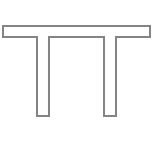Phd may session
Saturday 31 may 2025
FEEDBACK
UTC CONVERTER
15:00 - 16:00 UTC
GUEST INTRO AND BRAVER SPACES CHECK-IN
public talk - Sound and Space
Mary Edwards
22:00 - 23:00 UTC*
*Note: THIS SESSION MAY TAKE PLACE ON SUNDAY 1 june in your time zone
Sunday 1 june 2025
FEEDBACK
23:00 - 00:45 UTC*
GUEST INTRO AND BRAVER SPACES CHECK-IN
public talk - Modes of Negating, Negativities and Affirmation’s Crucial Critique
Antonia pont
*Note: THIS SESSION MAY TAKE PLACE ON monday 2 june in your time zone
public talk
Sound and space
With mary edwards
Spaces and places speak, hum, and bellows with echolocation. The natural environment, much like architecture or our physical beings, exude intonations and wordless music. Entire scores exist in the depths of the ocean, waiting to be transcribed from a body of water to a body of sounds that convey and express the harmonies and dissonance in our everyday lives.
How do we seek out the conversations that take place at the intersection of these ideas in how sound can unearth or revitalize hidden or obscure histories, stories and events within places, bodies and containers? How can we play with recollection of events paired with addressing environmental exclusivity?
In this talk, Edwards will synthesize these ideas in a discussion of projects: a composition that is an “ode rather than an elegy” to the transforming Arctic landscape/Space Analogues intended to sonically provide access for all by “de-centralizing the centered and un-othering the others” with an understanding of climate vulnerability, elemental sensuality and terrestrial/space connectivity; a poem about environmental stewardship and the pursuit of education in the Jim Crow Era; an aqueous soundscape whose own memory and "voice" implies both a tenacity and a detachment evidenced by the predicament of a tiny but mighty waterway that was once the centerpiece of the 19th Century New England textile industry; and an immersive installation of sonorous geological and oceanographic assemblages in response to my encounters on mountain in Northern California that evoke seismic activity—both destructive and regenerative—as frightening things can also be beautiful.
BIO | site | Recording
__ __ __
public talk
alternative reality gardening
With maggie buxton
Image: Maggie Buxton
In this presentation, Dr Maggie Buxton offers a critical analysis of Alternative Reality Gardening - a project facilitated by her company, AwhiWorld in Whangārei, NZ. The initiative explored the intersections between digital arts, ecological sustainability, and social innovation. Dr. Buxton will discuss the methodologies and outcomes of merging traditional and emerging technologies in creative practices through a retrospective examination. This analysis will include a review of the diverse contributions from local and international artists, scientists, space researchers, farmers, psychotherapists, and others who collaborated. Highlighting the project's role as a catalyst for social ínnovation and transdisciplinary practice, the talk will also examine the broader implications of such innovative approaches for academic research and artistic production. Attendees will learn how transdisciplinary strategies can challenge conventional perspectives and foster novel solutions to contemporary global issues.
site | syllabus | Recording
__ __ __
public talk
Modes of Negating, Negativities and Affirmation’s Crucial Critique
With Antonia pont
In this two-part talk, Antonia Pont will consider modes of negating in critique.
Part I (45 minutes)
We will begin by considering various modes of negating from philosophy, as well as how we might practise “unknowing” as a way to allow for emergent intimacy with our negating habits and their traces. How do we (tend to ) resist, how do we (tend to) comply, how do we tantrum, or even how might we sometimes decide? We might traverse a series of salient fragments of texts (of various species) or find ourselves sharing anecdotally a number of modes in which negation operates. We can allow a consideration of timing, time, temporal layers and patience to bear on our own potential, lived ethics of negation. There will be time for relaxed examples of how negation opens, closes, stalls, and, and, and… from life, in our work, in how we meet the unforeseen.
Break (15 minutes)
Part II (45 minutes)
Next, we will consider the interplay between the ‘plain No’ of steady critique, and its role in affirmative moves, inventions, risks and… pauses. Overall, one wonders about the negativities (spacing, waiting, lostness, doubt and distraction) which animate and nourish our creative decisions, methods of orienting work and non-work, and the important viscosity of negativity and its contribution to genuine experimentation and original making. How might we read all of these freshly and precisely, in order to bring nuance to our meetings with change? How is negativity (as explored and determined by participants) a generosity, a provocation, that art holds space for?




